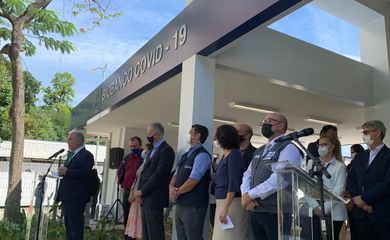Bio-Manguinhos e Saúde implement project for vaccine coverage

The Institute of Technology in Immunobiologicals (Bio-Manguinhos) and the Secretariat for Surveillance and Health of the Ministry of Health signed, today (13), a protocol of intentions to implement the Reconquista das Altas Vacinais Coverage project. The project establishes an inter-institutional collaboration network, with the participation of national and international members from the governmental, non-governmental and private sectors, in the search to improve the Brazilian vaccination coverage. Due to its trajectory in the supply of products for the Unified Health System (SUS) and also in the search for solutions for the present and future of public health, the project coordination is with Bio-Manguinhos/Fiocruz alongside the Secretary.

According to Fiocruz, despite being considered one of the most effective immunization programs in the world and constant efforts to maintain the supply of vaccines included in the country's Vaccination Calendars, the National Immunization Program (PNI) “has been facing a scenario adverse to achieve the vaccine coverage rates necessary for the collective immunity of the vaccines it makes available”.
For the director of Bio-Manguinhos, Maurício Zuma, resuming high vaccination coverage is to prevent deaths from diseases for which vaccines already exist, as happened in recent years with yellow fever and measles.
“It means optimizing hospital care, freeing up beds that are occupied by patients infected, for example, with influenza – as is now the case in Greater Rio. We have responded and delivered record deliveries in these recent outbreaks, but many lost lives, family dramas, and SUS hospitalization costs could have been avoided with vaccination,” he said.
The project envisages strategic support actions for the PNI to reverse the downward trajectory in vaccination coverage in the national calendars for Vaccination of Children, Adolescents, Adults and Elderly, Pregnant Women and Indigenous Peoples. According to Fiocruz, the change is necessary to ensure the control of vaccine-preventable diseases such as measles, polio, influenza, cervical cancer, meningitis and all others whose vaccines are made available free of charge to the population, at health centers health.
Alerts
Fiocruz drew attention to the warnings that specialists in immunization and health surveillance from different governmental and non-governmental institutions have been issuing in recent years, about the progressive drop in vaccination coverage in Brazil, a scenario that was aggravated by the covid-19 pandemic. But there are other factors that influence this scenario, such as the population's lack of awareness of the severity of these diseases, including due to the success of the PNI; fake news, which have repercussions on hesitation to vaccinate; and also because of structural problems in the country.
“The warning of low vaccination coverage is accompanied by the reintroduction of vaccine-preventable diseases such as measles”, informed Fiocruz.
According to Fiocruz, vaccination coverage has been falling all over the world for five years, including Brazil. As a result, in 2019 the World Health Organization (WHO) defined vaccine hesitation as one of the ten biggest public health problems in the world.
Measures
Among the measures that the project will develop are the organization of existing information on the causes of low vaccination coverage, between 2015 and part of 2021, in 16 municipalities in Amapá and in 25 municipalities in Paraíba. The operational plan of action on immunizations until 2025 for each municipality will be prepared together with states and municipalities.
There will also be support for finding solutions to bottlenecks and difficulties in local conditions, and promoting the sharing of best practices. Monitoring and monitoring of the execution of municipal plans and strengthening the exchange of best practices between states and municipalities are foreseen, including strengthening the integration of data and the information and communication system between the National Coordination, state coordinations and municipal immunization coordinations .
Amapá was chosen because the state has the most cases of measles. Paraíba, on the other hand, is because of the logistical facility, since the institute has a wide network of prior collaboration with institutions in Paraíba to carry out clinical studies.
The expectation is to complete by March 2022 the first expected result, which is the preparation of action plans for these two states, with the mapping of the causes of low vaccination coverage by municipality surveyed; and the preparation, together with the states and municipalities, of the first 41 Immunization Operational Action Plans.
According to Fiocruz, the PNI offers the entire population high quality vaccines to fight more than 20 types of diseases, registered by the National Health Surveillance Agency (Anvisa) and approved by INCQS/Fiocruz.
“The Program was responsible for the eradication of smallpox, the elimination of polio, rubella, congenital rubella syndrome and measles – which, unfortunately, returned with low vaccination coverage, reaching susceptible populations. Today we have the lowest number of notifications of vaccine-preventable diseases in the history of Brazilian public health”, said Fiocruz.
Text translated using artificial intelligence.



